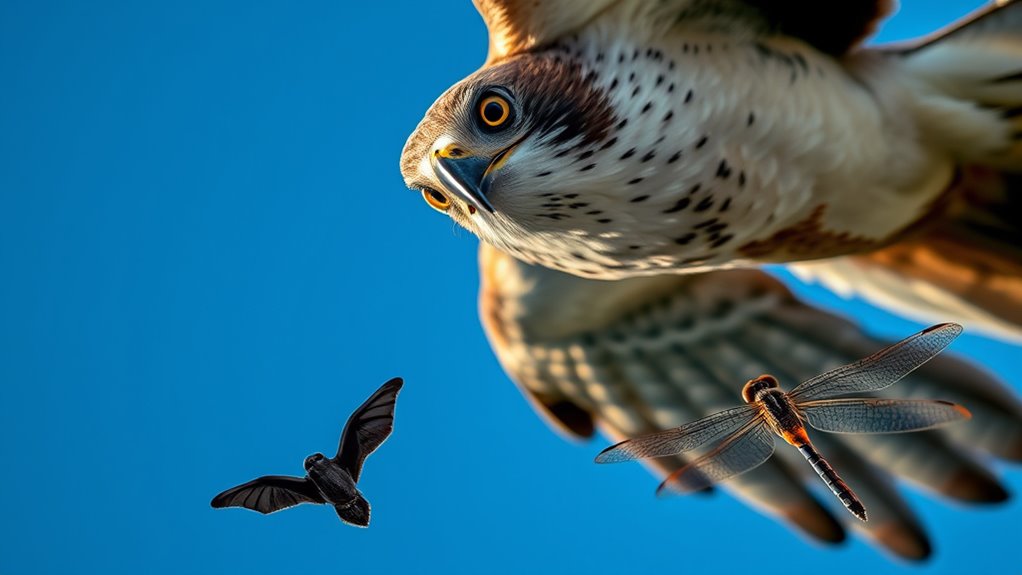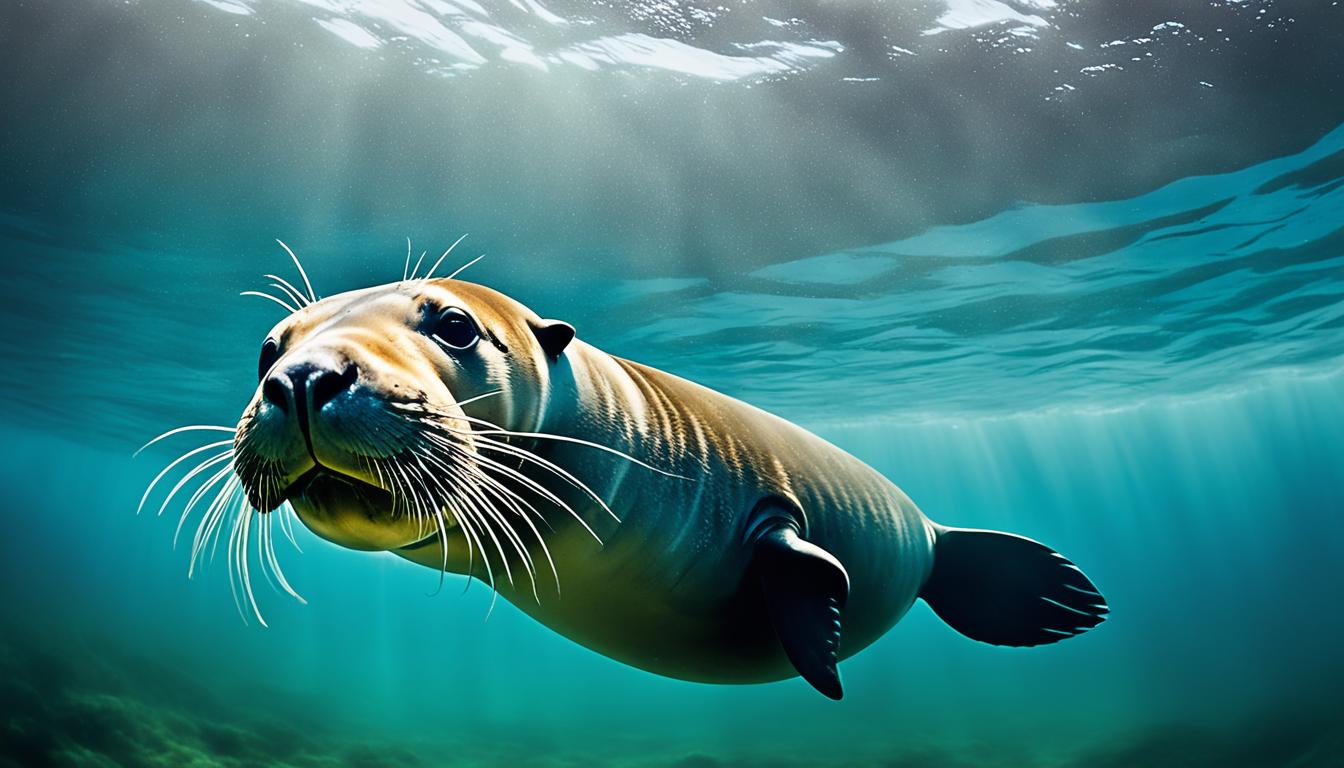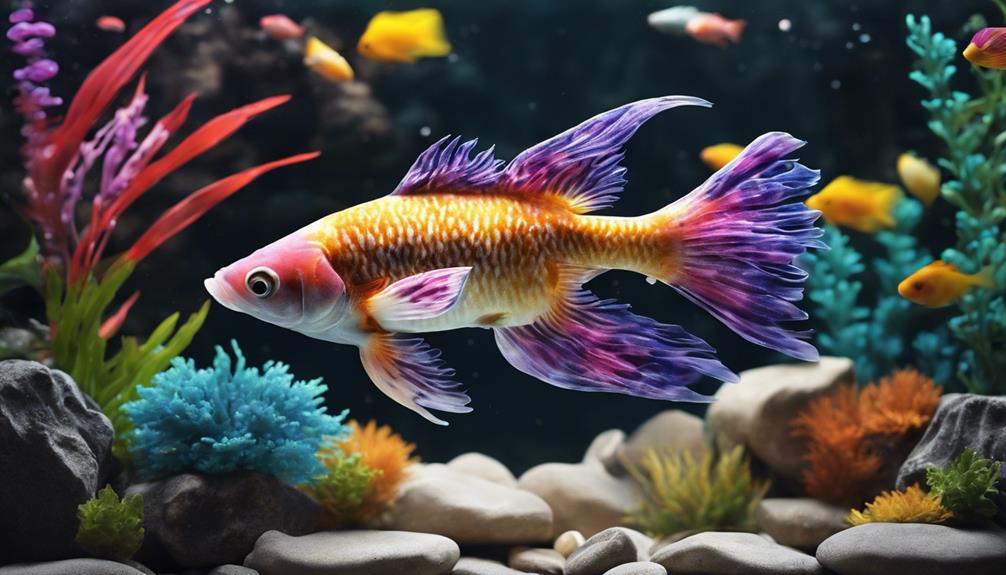Animals have incredible senses that go far beyond human abilities, helping them find food, avoid danger, and communicate. Dogs can track scents over miles, sharks detect blood in the water, and eagles spot prey from great heights. Bats and dolphins use echolocation to navigate in complete darkness, while mantis shrimp see colors humans can’t imagine. If you’re curious about these amazing adaptations, there’s a lot more fascinating information to explore.
Key Takeaways
- Animals possess highly specialized sensory adaptations, allowing them to perceive signals beyond human capabilities.
- Dogs and sharks have exceptional olfactory senses, detecting scents and chemical signals over long distances.
- Birds like eagles and mantis shrimp have advanced visual systems, enabling them to see ultraviolet light and detect minute details.
- Echolocating animals such as bats and dolphins use sound waves for navigation, hunting, and communication in complete darkness.
- Sensory diversity provides animals with survival advantages, shaping how they interpret and interact with their environments.

Animals perceive the world in ways that often surpass human senses, giving them remarkable abilities to navigate their environments and survive. This incredible perception diversity stems from specialized sensory adaptations that have evolved over millions of years. These adaptations allow animals to detect signals beyond the reach of human capabilities, providing them with essential survival advantages. For example, many creatures have heightened senses of smell, sight, or hearing, enabling them to find food, avoid predators, and communicate effectively.
Animals have sensory abilities that surpass human perception, giving them vital survival advantages in their environments.
Your sense of smell might be powerful, but some animals excel far beyond that. Dogs, for instance, have an olfactory system that’s thousands of times more sensitive than yours. They can track scents over miles and pick up on chemical signals that remain undetectable to humans. This sensory adaptation is indispensable for hunting, search-and-rescue missions, and even detecting health issues. Similarly, sharks possess a keen sense of smell that helps them locate prey from great distances, detecting blood in the water at incredibly low concentrations. Their perception diversity allows them to thrive in environments where their survival depends on sensing minute chemical cues.
When it comes to vision, some animals have evolved extraordinary capabilities. Birds of prey like eagles have eyesight so sharp that they can spot a small rodent from hundreds of feet in the air. Their eyes are equipped with a high density of photoreceptor cells, giving them unmatched visual acuity. In the ocean, mantis shrimp possess complex eyes with multiple color receptors, allowing them to see a spectrum of colors far beyond human perception. This sensory adaptation helps them identify prey, predators, and mates in the often dim and murky underwater world.
Hearing is another sense that animals have fine-tuned to extraordinary levels. Bats use echolocation to navigate and hunt in complete darkness, emitting high-frequency sounds and interpreting the echoes that bounce back. This perception diversity lets them avoid obstacles and catch insects with precision. Dolphins also use echolocation to communicate and hunt underwater, detecting objects and even the size and shape of prey through sound waves.
In all these cases, animals demonstrate how sensory adaptations create perception diversity, giving them a distinct advantage in their habitats. You can think of it as nature’s way of customizing senses to fit specific needs—some animals see better, smell stronger, or hear more acutely than you ever could. These super senses aren’t just fascinating; they’re indispensable tools for survival, allowing animals to interpret their worlds in ways that are sometimes completely invisible to us.
Frequently Asked Questions
Can Animals Develop Super Senses Through Training or Adaptation?
You might wonder if animals can develop super senses through training or adaptation. While sensory training can enhance certain abilities temporarily, true super senses usually come from adaptive evolution over generations. Animals adapt by naturally evolving heightened senses suited to their environments. So, although training can improve performance, lasting super senses result from evolutionary changes, giving animals extraordinary perception that isn’t easily replicated through training alone.
How Do Animals’ Super Senses Compare to Human Senses?
It’s fascinating how, by coincidence, your senses differ from animals’ super senses. While humans have perceptual limitations like limited hearing and smell, animals often surpass us with extraordinary abilities. Their sensory differences allow them to detect things impossible for you, such as a dog’s keen sense of smell or a bat’s echolocation. These distinctions highlight nature’s diversity, showing how animals adapt their senses to survive, far beyond human perceptual capabilities.
Are There Any Animals With Senses Beyond Our Understanding?
You wonder if any animals have senses beyond our comprehension. Many animals exhibit sensory enhancement through evolutionary adaptation, allowing them to detect things we can’t perceive. For example, sharks sense electromagnetic fields, and pigeons navigate using Earth’s magnetic field. While these abilities seem extraordinary, scientists believe some animals may possess even more advanced senses that remain undiscovered, pushing the boundaries of what we understand about sensory perception in the animal kingdom.
How Do Super Senses Influence Animal Behavior and Survival?
Super senses greatly influence animal behavior and survival by providing sensory enhancement that helps them detect predators, find food, and communicate. When you understand this, you see how these heightened abilities shape their survival strategies, allowing them to react faster and adapt to their environment. Your awareness of super senses reveals how animals thrive through remarkable perception, giving them advantages that often surpass human capabilities and ensure their continued existence.
Can Humans Ever Perceive the World Like Animals Do?
You wonder if humans can ever perceive the world like animals do. Due to sensory limitations, our senses aren’t as finely tuned as theirs, but evolution gives animals unique advantages like heightened smell or vision. While you can’t fully experience their perceptions, technology and training help expand your understanding. Still, you’ll always be limited compared to their extraordinary sensory abilities, which have evolved for survival in ways you can’t replicate.
Conclusion
Just like a master artist uses every brushstroke to create a vivid masterpiece, animals harness their incredible senses to navigate and interpret their world. Their super senses are not just extraordinary; they’re essential tools that allow them to survive, communicate, and thrive. By understanding these remarkable abilities, you gain a new appreciation for the complexity of life around you. It’s as if the animal kingdom has revealed a secret language, waiting to be fully understood.










